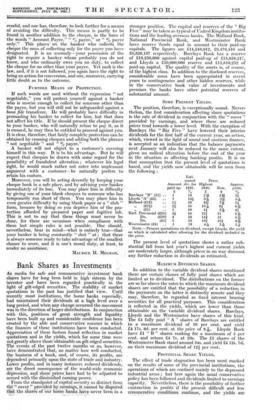FURTHER MEANS OF PROTECTION.
If such words are used without the expression " not negotiable," you will protect yourself against a banker who is unwise enough to collect for someone other than the payee, but you will still not be safeguarded against a bona fide transferee. He will probably have difficulty in persuading his banker to collect for him, but that does not affect his title; If he should present the cheque direct to your banker, who will naturally refuse to pay it, as it is crossed, he may then be entitled to proceed against you. It is clear, therefore, that fairly complete protection can be obtained by crossing cheques and adding both the phrases " not negotiable " and " % payee."
A banker will not object to a customer's covering himself in this way. It is to his advantage. But he will expect that cheques be drawn with some regard for the possibility of fraudulent alteration ; whatever his legal right, he would much rather not enter into unpleasant argument with a customer—he naturally prefers to retain his custom.
Moreover, you will be acting decently by keeping your cheque book in a safe place, and by advising your banker immediately of its loss. You may place him in difficulty by giving one of your blank cheques to someone who has temporarily run short of them. You may place him in even greater difficulty by using blank paper or a " club " form, because by doing so you deprive him of the pro- tection afforded by prepared paper and fugitive ink. This is not to say that these things must never be done, for there are occasions when compliance with these last simple rules is not possible. One should, nevertheless, bear in mind=what is entirely true—that your banker is being constantly " shot " at ; that there is always someone ready to take advantage of the smallest chance to score, and it is one's moral duty, at least, to render no assistance.
MAURICE H. MEGRAH,










































 Previous page
Previous page